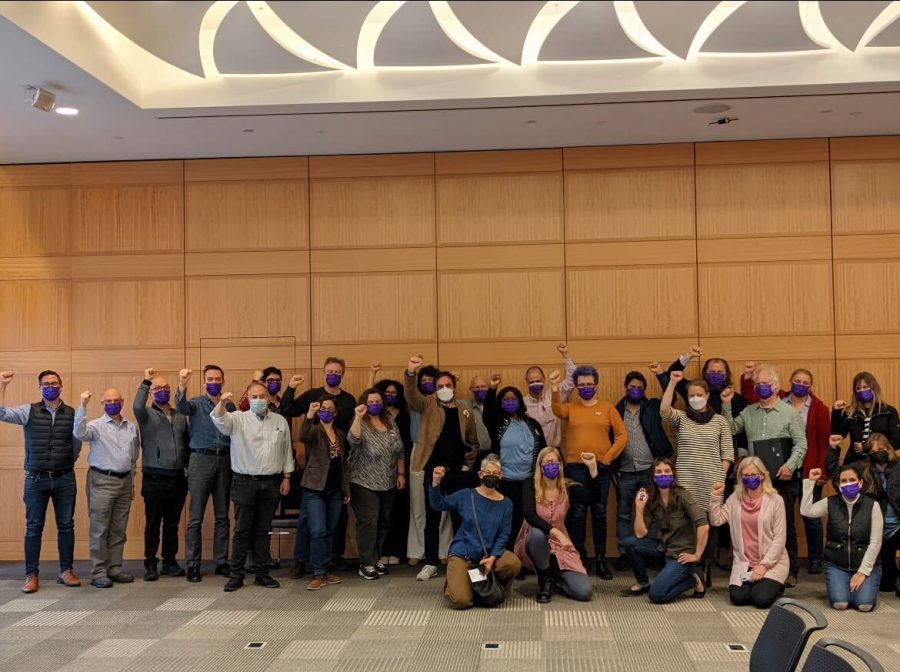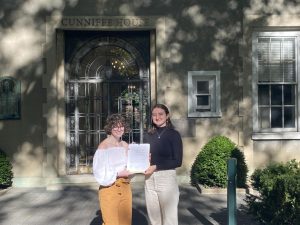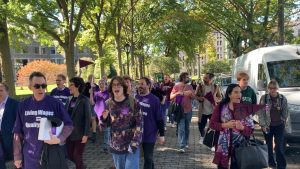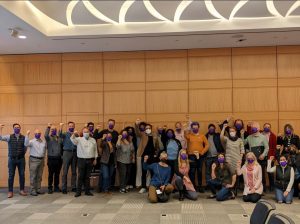Jesuit Institution of Higher Learning Bargains at a Round Table
The university must take additional steps in order to prevent labor disputes in the future
COURTESY OF DIANE GEORGE
Fordham Faculty United experienced contentious contract negotiation sessions with the Fordham administration
March 3, 2023
On Monday, Jan. 30, the membership of Fordham Faculty United (FFU) did not strike. Instead, the union passed the newest iteration of the proposed contract that had been approved by Fordham University’s administration on Wednesday, Jan. 18.
I was hired as a professor at Fordham in early August 2018, just after FFU had ratified its very first Fordham contract for contingent faculty. I was not a part of this first negotiation between FFU and the administration, but after teaching for seven continuous years as an adjunct associate professor at the New York University Graduate School of Social Work in the late 1990s — where our salaries were woefully low and we certainly were not unionized — I was over-the-moon delighted to learn that at Fordham, contingent faculty had a union.
This was my first introduction to working at a Jesuit institution of higher learning: discovering that Jesuit institutions recognize and value the collective power of their labor.
Additionally, all of my students in both of my courses consistently demonstrated conscientious work ethics, an attitude of courteous mutual respect, a lack of entitlement, and an earnest desire to be of service and to have purpose.
Before becoming an adjunct instructor at Fordham, I knew nothing about Jesuit schools. However, several experiences at Fordham shaped my “person-in-situation” lens, or the idea that we learn to see our worlds through the situations we are in. It is this same thinking that caused me to feel startled when I found myself at adversarial negotiations between FFU and Fordham administration.
I was first hired at Fordham to teach a new course that would be required for all first-semester Graduate School of Social Service (GSSS) students: Social Work Skills Lab. In September of 2018, I was additionally asked to become a field adviser and to teach second-year GSSS students specializing in substance abuse and addiction in their field placements.
During this time, I learned that my Fordham graduate students were like no other students I had ever taught, nor were they similar to the students by whom I’d been surrounded when I was a graduate student at Columbia University. Without exception, every student in my Fordham classes was going to school full-time as well as working part-time — some even working full-time jobs along with their full-time graduate school schedule — in order to pay for their education. Additionally, all of my students in both of my courses consistently demonstrated conscientious work ethics, an attitude of courteous mutual respect, a lack of entitlement, and an earnest desire to be of service and to have purpose.
It was on this commission — where I was surrounded by other contingent faculty, tenured faculty, tenure-track and nontenure-track faculty, Fordham IT staff, Bronx community leaders and administrative staff — that I became convinced that Jesuit institutions of higher learning are truly committed to inclusivity and equity.
An additional introductory experience that shaped my impression of working at a Jesuit school occurred two years later. In January of 2020, I applied and was invited to be a participant in Fordham’s ReImagine Higher Education commission. It was on this commission — where I was surrounded by other contingent faculty, tenured faculty, tenure-track and nontenure-track faculty, Fordham IT staff, Bronx community leaders and administrative staff — that I became convinced that Jesuit institutions of higher learning are truly committed to inclusivity and equity.
In March of 2020, when the COVID-19 pandemic hit, the Fordham community mobilized overnight to support its students and faculty. For all Fordham faculty, both contingent and noncontingent, the Zoom course “Flexi Hybrid 1000” was created and held daily to show staff how to pivot to online teaching. At these daily Zoom “teach-ins,” I experienced that a Jesuit institution of higher learning is an immediate, caring, hands-on community.
During these early months of the pandemic, Fordham IT provided 24/7 access and gave countless technology workshops for faculty. In my experience, no matter how many times and in how many ways I needed help to finish teaching my class on Zoom in the spring of 2020, Fordham IT staff gave me support with reliable patience and kindness.
We later learned that while running a workshop for Fordham management during the ongoing negotiations with FFU, the Jackson Lewis Counselor who was advising Fordham administration on their bargaining strategy acknowledged that contingent faculty were accurate when asserting that their wages put them below poverty level.
Lastly, this past summer, I was invited to participate in the first annual weeklong Faculty Retreat workshop to study and revise our syllabi with a view toward decolonizing our individual syllabus. Here again I was surrounded by dedicated Fordham faculty, both contingent and tenured, for an immersive week that explored a multiplicity of ways that we could bring 21st-century pedagogical innovation into our classrooms.
These experiences have all led me to the conclusion that Jesuit institutions know that community is where we will find the light to see us through the darkness. And Jesuit institutions attract the kind of faculty and staff who are drawn to service and devoted to the riches of community life.
With these experiences in mind, I was surprised when I arrived at the FFU bargaining sessions in April of 2022 to experience adversarial negotiations led by the Fordham administration under the guidance of the law firm Jackson Lewis, known nationally for its reputation in crushing labor movements. We later learned that while running a workshop for Fordham management during the ongoing negotiations with FFU, the Jackson Lewis Counselor who was advising Fordham administration on their bargaining strategy acknowledged that contingent faculty were accurate when asserting that their wages put them below poverty level. FFU leaders and members wondered why Fordham would have gone to such an expense to hire the firm of Jackson Lewis with its fearsome anti-labor reputation.
I also was curious about why Fordham had felt this expensive choice was necessary, when the prior year, FFU’s membership had unanimously made it clear that we considered us all “one Fordham.” The university was legally bound to renegotiate the 2018 FFU contract for the spring of 2021, but in December of 2020, Fordham’s administration came to the FFU executive committee and asked if FFU would be willing to put off contract negotiations for a year due to the dire upheaval of the pandemic. Taking this request back to FFU membership for a vote, it was unanimously agreed that FFU would remain working under the 2018 contract for one additional year because “we are all one Fordham.”
I believe that for Fordham to choose the expense of hiring the Jackson Lewis firm, they must have felt tremendous fear. But why? Why, when FFU had, in good faith, been willing to sacrifice themselves to help Fordham?
In all the FFU bargaining sessions that I attended, the spirit of equality and mutual sharing was missing. It was not like we were all adults in the room, but, instead, as if we were the FFU teenagers coming to ask their Fordham administration parents to give them a raise in their monthly allowance.
In one June bargaining session where I was asked to give the introductory reflection, Fordham administration arrived an hour late to the bargaining session without any warning or call. If any of my Fordham students arrived late to my class without some explanation, they would be marked absent. Yet, FFU was expected to go on negotiating that day, unfazed by the behavior of Fordham administration. Fordham administrators are paid salaries for their negotiating work, but all work done by FFU members is voluntary. Their lateness seemed to me to be a common negotiating tactic: You, labor, need us, the management. We don’t need you! You will wait for us!
Are we truly a Jesuit institution that follows a higher authority than the marketplace, or are we simply another university-corporation?
At a later bargaining session, I was again asked to share some of my views for FFU, and I quoted the most recent Fordham statistics on monies collected in tuition and fees and then spent on all salaries, wages and research — concluding by saying: “What this says to us is the university is making choices. There is room to do better in compensating adjunct professors, and there is room for parity in GSSS adjunct salaries.” I was startled when the Jackson Lewis Counsel bellowed: “We don’t care what you think!” You hired me to teach your students, but you don’t care what I think?
I believe that I am older than any of the Fordham administration and the legal counsel who sat at that negotiating table. I have a master’s of science from an Ivy League university and two advanced postgraduate certificates in psychoanalysis. I have raised three daughters, all of whom have college degrees and two of whom have graduate degrees. I spent my adult life budgeting so that I could put my girls through private schools. I have an accomplished clinical career working with hundreds of clients and colleagues, yet the leading counsel for Fordham administration doesn’t care what I think?
This behavior is a far cry from the standard of mutual respect that my Fordham students demonstrate and that I believe is mandatory at a university. This management versus labor, adversarial approach was completely antithetical to anything I had experienced at Fordham thus far. What kind of professor would I be if that was my attitude toward my students?
Throughout the contract negotiation process, the administration kept using the phrases: “This is what the marketplace dictates,” or “the marketplace does not support that.” When I would hear these phrases of the “marketplace” used repeatedly to justify minimal wage increases, no healthcare and no pay parity for contingent faculty, I kept hearing the words of Jesus of Nazareth: “Be in this world but not of it.” Are we truly a Jesuit institution that follows a higher authority than the marketplace, or are we simply another university-corporation?
When we meet again to bargain in 2025, as equal adults committed to our work at Fordham, we can all work together to appropriately apportion the income we earn for the institution to provide a humane living wage and sustainable, healthy living in the tri-state area.
Toward the end of negotiations, I began to wonder: Am I crazy to imagine we’re being treated like teens asking for a raise in our allowance? Am I crazy to expect the mutual respect of being told management would be delayed an hour to the bargaining session? Was I crazy to believe that Fordham is truly a special university attracting particularly devoted and service-driven people?
Then, just as we were preparing for our strike, a retired Jesuit reached out to us at FFU and asked us where he could donate to the strike fund for the striking contingent faculty. That’s when I knew for sure: If a retired Fordham Jesuit, who has taken a vow of poverty, wants to donate some of what little he has to help support our FFU efforts for living wages, healthcare and pay parity — then I have the right thinking.
I am happy that FFU and the administration reached an agreement and avoided a strike. But, my experiences at Fordham have taught me that when we come to the bargaining table again in the spring of 2025, we can do better!
In all the courses I have taught, we meet in a circle. There is purpose to this form because it facilitates interaction, connection, brainstorming, mutual aid. In the round, there is an equality to our humanity that cannot be ignored. When we meet again to bargain in 2025, as equal adults committed to our work at Fordham, we can all work together to appropriately apportion the income we earn for the institution to provide a humane living wage and sustainable, healthy living in the tri-state area. Fordham is a vital, hands-on, caring community, where students embody the behavior of mutual respect and faculty model lifelong learning and where respectful contract bargaining can happen at a roundtable.













